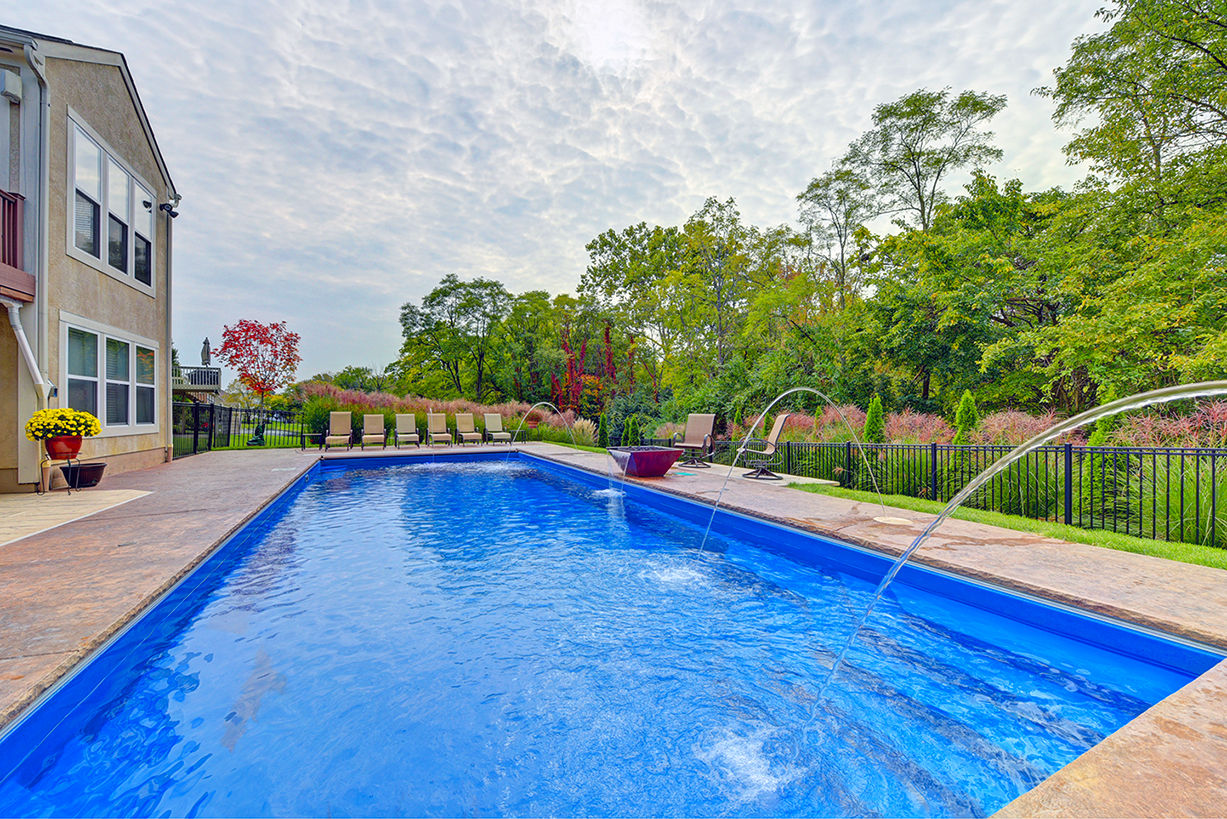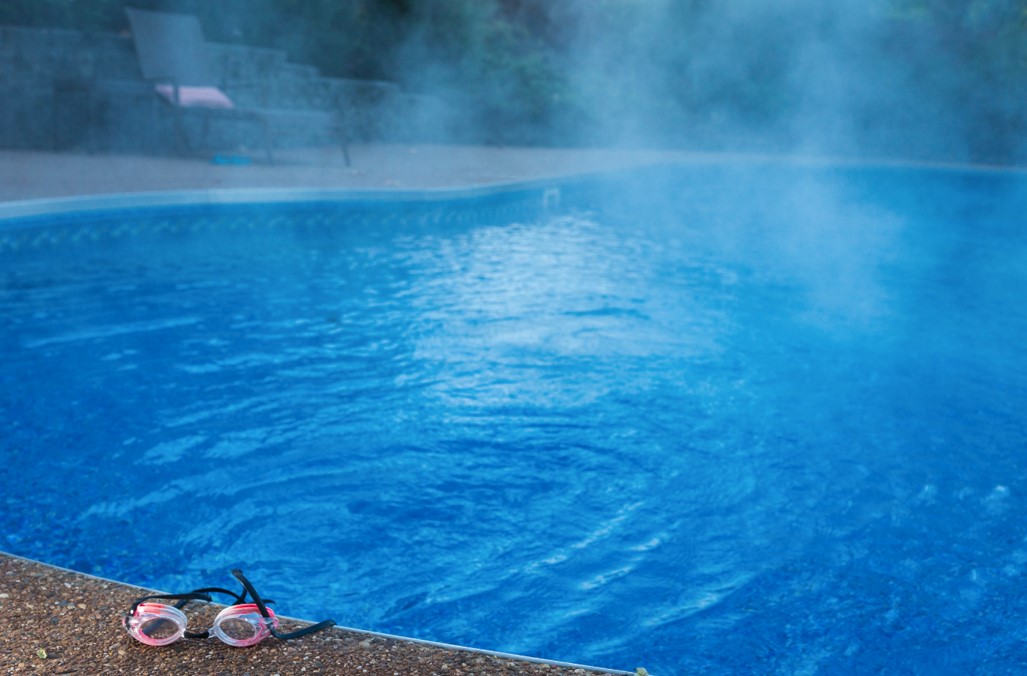Swimming Pool Accessories

Bring Holiday Cheer to Your Pool: Lighting and Party Inspiration
December 6, 2024Barrier Reef Fiberglass Pools encourages you to bring the holiday cheer outdoors this season by transforming your pool area into a festive space. Whether you’re hosting a holiday gathering poolside or simply enhancing your backyard’s seasonal ambiance, you can create a warm and inviting atmosphere that reflects the spirit of the holidays. Here are some inspiring ideas to light up your pool area this holiday season!

Evaporation vs Autofill: Understanding Float Valve Water Leveler Systems
June 15, 2024Maintaining a swimming pool involves more than just keeping it clean; it also means ensuring that the water level is optimal. One of the most vexing issues facing pool owners is water evaporation, which causes significant and constant water loss over time. Fortunately, float valve water leveler "autofill" systems offer an effective solution to this problem.

Pool Cleaners: Different Types & Functions
May 18, 2024Every pool owner knows that keeping your pool clean is a vitally important part of responsible pool ownership; when well done, it can make all the difference in the beauty, longevity, and functionality of your pool.
Maintaining a clean swimming pool is essential for swimmers' health and safety, the long-term usefulness of pool equipment, and the overall enjoyment and aesthetics of the pool environment.
Regular cleaning, proper chemical balance, and routine maintenance are key components of effective pool care. However, with the right cleaner, maintaining a pristine fiberglass swimming pool can be simple and relatively easy.
Types of Pool Cleaners
There are several types of swimming pool cleaners, each with its own set of features and advantages. The main types of pool cleaners include:
Suction-Side Pool Cleaners:
How They Work: These cleaners use the suction power created by the pool's circulation system to move around and collect debris.
Advantages:
- Generally less expensive.
- Easy to install and operate.
- Suitable for small to medium-sized debris.
Pressure-Side Pool Cleaners:
How They Work: These cleaners use the water pressure from the pool's return jets to propel themselves and collect debris.
Advantages:
- Can handle larger debris better than suction-side cleaners.
- Helps distribute clean, filtered water throughout the pool.
Robotic Pool Cleaners:
How They Work: These are self-contained, electrically powered cleaners that operate independently of the pool's circulation system. They are equipped with their own filter and pump.
Advantages:
- Highly efficient and effective in cleaning.
- Operate independently, reducing strain on the pool's filtration system.
- Can handle various pool sizes and shapes.
Manual Pool Cleaners:
How They Work: These are tools that require manual effort to clean the pool. Examples include manual pool vacuums, brushes, and skimmers.
Advantages:
- Inexpensive compared to automated cleaners.
- Direct control over cleaning areas.
In-Floor Cleaning Systems:
How They Work: These systems are built into the pool floor and use pop-up nozzles to direct water in a way that moves debris toward a drain.
Advantages:
- Provides comprehensive and automated cleaning.
- No visible cleaning equipment in the pool.
Disadvantages:
- Expensive to install.
- May require specialized maintenance.
When choosing a pool cleaner, consider factors such as the size and shape of your pool, the type and quantity of debris, your budget, and your preference for manual or automated cleaning. Robotic cleaners have gained popularity due to their efficiency and convenience, while suction-side and pressure-side cleaners remain viable options for many pool owners.
Why does it matter which cleaner you choose? Because your choice of the right cleaner can save you time, effort, and even money in the long run. By learning the available types of pool cleaners available and understanding which one suits your pool's unique characteristics, you can ensure you're making the right investment for years of crystal-clear water enjoyment.
Why Does the Type of Pool Cleaner Matter?
The type of cleaner you pick can significantly impact the cleanliness of your pool, as well as your time and budget.
The suction-side cleaner is essentially the reliable workhorse of the pool cleaner family. It connects to your existing filtration system, skimming debris and dirt as it goes. Great for smaller debris, it's a budget-friendly option but might struggle with larger objects.
On the flip side, pressure-side cleaners use the power of your pool's return jet, providing a bit more oomph. They're excellent for larger debris but may require a booster pump, adding to the initial cost.
What about independent robotic pool cleaners? These technological marvels navigate your pool autonomously, boasting advanced cleaning technology and energy efficiency. While they come with a higher upfront cost, the long-term savings in energy and water make them a favorite among pool aficionados.
When choosing your cleaner, consider not only your pool's size and shape but also your cleaning preferences, budget, and the level of overall efficiency you're aiming for.
Are There Special Considerations for Fiberglass Pools?
Absolutely! Fiberglass pools are known for their smooth, non-porous surfaces, making them more resistant to algae and bacteria.
For instance, robotic cleaners tend to work well in fiberglass pools due to their gentle scrubbing brushes and no-nonsense filtration systems. They delicately clean without causing any harm to the pool's surface. On the flip side, some suction-side and pressure-side cleaners might not be as forgiving.
So, if your pool has a fiberglass shell, you should consider the cleaner's design, brushes, and overall compatibility with your pool's surface. By doing so, you'll ensure your fiberglass pool stays in tip-top shape for years to come.
What Maintenance Tips Can Enhance the Performance of My Pool Cleaner?
How can you ensure your chosen cleaner performs at its best?
For starters, regularly check and clear your cleaner's filter to prevent clogs and optimize suction. Keep an eye on the hoses, brushes, and any movable parts, ensuring they're free from debris or damage. If you've got a robotic cleaner, make sure to clear the filter canister and brushes after each use for maximum efficiency.
Additionally, be mindful of your pool's water chemistry. Balanced pH levels and proper chemical maintenance not only keep your pool water safe for swimming but also contribute to the long-term durability and service life of your cleaner.
Whether you're eyeing suction-side simplicity, pressure-side power, or modern robotic autonomy, aligning your cleaner with your pool's unique needs is key to enjoying the ease and efficiency that the right cleaner will bring to your pool ownership journey.
At Barrier Reef Pools, we encourage you to browse our selection of beautiful fiberglass swimming pools. If you have any questions, contact us here.
We would love to help you find your new pool!

Pool Automation: Smart Pool Controls for Mobile Devices
January 6, 2024Imagine having the power to control your swimming pool right from your smartphone, whether you're at home or miles away. That level of convenience and efficiency is unmatched, making it a real game-changer for pool owners. But with so many options out there, which smartphone swimming pool automation control devices stand out in 2024?

Pool Covers: Vinyl vs Automatic – Comparisons
September 8, 2023Which Type of Swimming Pool Cover Best Fits Your Needs?
Owning a swimming pool is a major investment in time and money, and many pool owners consider different ways to protect their pool. One way includes installing a pool cover to protect their investment in the long run. When that time comes, one of the primary decisions they face is the choice between an automatic pool cover and a vinyl pool cover.
When it comes to making a choice between an automatic or a vinyl pool cover, it will ultimately depend on your specific needs. Automatic covers are convenient and offer excellent safety by covering the pool with a sturdy material at the push of a button. On the other hand, vinyl covers are more budget-friendly while still providing a barrier against debris and evaporation. Different climates, maintenance requirements, and long-term costs are also important factors in determining the best choice for your situation.

Swimming Pool Heater/Chiller Units: What You Need to Know
April 18, 2023What is a Swimming Pool Heater/Chiller Unit?
A swimming pool heater/chiller unit is a device that uses a heat exchanger to regulate the temperature of the water in a swimming pool, either heating or cooling it depending on the current need. It heats the pool water for comfortable swimming in cooler weather or cools the water during hot summer months. These units work by transferring heat energy from the air or the water into the pool water, or by the use of internal cooling fan units that chill the pool water as it circulates through the pump, depending on whether the heater/chiller is being used for heating or cooling.
Heat pump units and pool fan chillers are often used by pool owners for the same purposes, although such standalone devices can only warm the water, or cool it— not both. In regions where the seasonal air temperature runs consistently either cold or hot, such single-purpose units are adequate. But a combination heater/chiller unit is ideal for those who live in regions where the temperature fluctuates widely throughout the year.
- 1
- 1-6 of 6 results